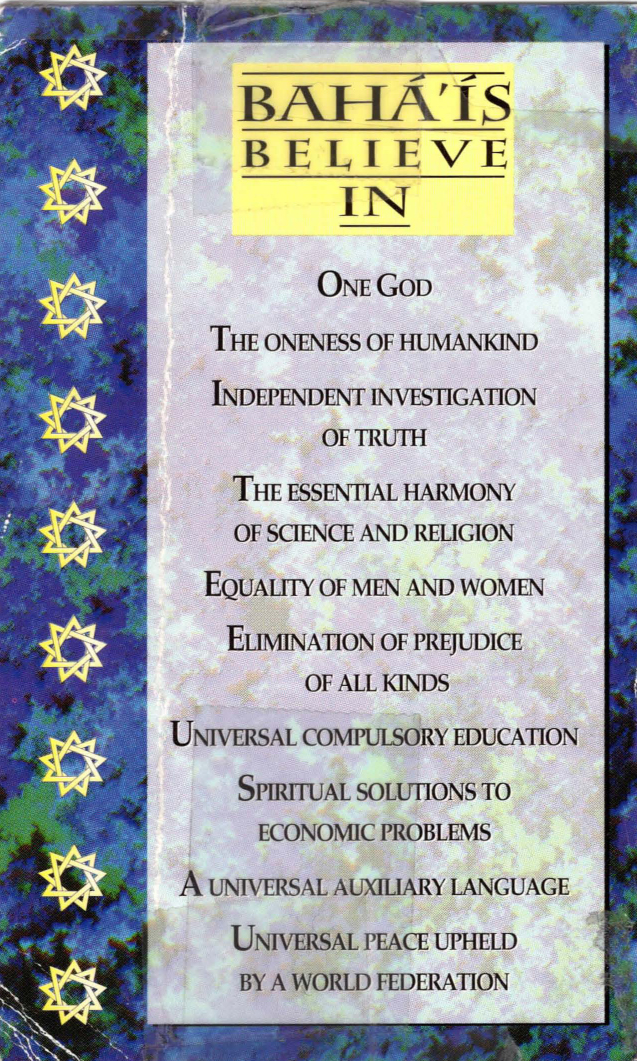The Baha’i Faith represents a synthesis of spiritual principles that advocate for unity, love, and justice. Founded in the mid-19th century by Baha’u’llah, the faith seeks to promote a vision of society characterized by equity and collaboration among diverse cultures and religions. As one delves into the core tenets of Baha’i teachings, an intriguing tapestry of beliefs emerges, promising not only a shift in perspective but also an invitation to explore the depths of our shared humanity.
At the heart of Baha’i teachings is the concept of the oneness of humanity. This principle posits that all individuals, irrespective of their background, ethnicity, or creed, are members of one global family. The Baha’is assert that prejudice, whether racial, religious, or social, is a fundamental barrier to human progress. By embracing this tenet, individuals are encouraged to transcend divisions and engage in intercultural dialogues that foster understanding and compassion. This transformative promise resonates deeply, inspiring adherents to view the world through a lens of inclusivity and empathy.
Another cornerstone of Baha’i doctrine is the belief in the oneness of religion. Baha’is assert that all major world religions stem from the same divine source, and they reflect successive revelations intended to guide humanity. Figures such as Krishna, Zoroaster, Jesus Christ, Muhammad, and Baha’u’llah are seen as Manifestations of God, each delivering teachings suited to the needs of their contemporary societies. This perspective not only engenders respect for other faiths but also creates a harmonious environment where mutual appreciation is cultivated. The realization that these revelations are interconnected offers a profound vision of spiritual unity that beckons exploration.
Inextricably linked to the oneness of religion is the belief in progressive revelation. The Baha’i Faith maintains that divine guidance is not static; rather, it evolves over time in response to humanity’s growing understanding of spiritual truths. Baha’u’llah’s teachings reflect this dynamic development, presenting insights that align with modern needs and aspirations. The implication here is astounding: as societal challenges transform, so do the religious tenets that help navigate them. Thus, followers are beckoned to engage with the contemporary world, harnessing spiritual principles to address pressing issues such as climate change, inequality, and conflict.
Social principles are woven intrinsically into Baha’i teachings, with justice serving as a pivotal theme. The Baha’i Faith accentuates the necessity for justice in all realms—social, economic, and political. Adherents are encouraged to strive for fairness and equity, advocating for systems that prioritize the well-being of all individuals. This commitment to justice translates into concrete actions aimed at alleviating poverty, fostering education, and promoting gender equality. Such a holistic approach to justice deeply resonates, conveying a profound sense of responsibility towards building a more equitable society.
Education plays a significant role within Baha’i teachings, regarded as a fundamental pillar for personal and societal advancement. Baha’is champion the idea that knowledge is not merely an accumulation of facts, but a means to empower individuals to make informed decisions and engage meaningfully with the world. The Baha’i emphasis on universal education extends beyond academia; it includes moral and spiritual education as well. This encapsulates the belief that equipping individuals with the tools to develop their character is imperative for shaping a just and peaceful society.
Furthermore, the concept of an administrative order underpins the organizational structure of the Baha’i Faith. This unique system prioritizes consultation and collective decision-making, embodying principles of democracy while respecting spiritual authority. The elected bodies that govern Baha’i communities worldwide function without clergy, emphasizing accountability and service. This administrative model is not merely a mechanism for governance; it reflects the Baha’i commitment to fostering global unity through collaboration. The success of this structure remains an invitation to examine alternative paradigms of leadership that prioritize collective welfare over individual ambition.
Baha’i teachings underscore the importance of individual spiritual development. Personal transformation is viewed as essential for both individual fulfillment and collective progress. The practice of daily prayer and meditation allows adherents to cultivate a deeper connection with the divine, facilitating a journey towards inner peace and enlightenment. The pursuit of virtues such as love, compassion, and humility enhances the individual’s capacity for service to others, enriching the fabric of society as a whole. This emphasis on personal growth resonates not only as a spiritual undertaking but also as an appeal for an elevated human experience.
Finally, the Baha’i vision encompasses an overarching call for the establishment of a peaceful and harmonious world. This dream is not utopian in its essence; rather, it is deeply grounded in the active engagement of individuals and communities. Baha’is aspire to be agents of change, embodying the principles of their faith through service, advocacy, and constructive contributions to society. Each individual’s commitment to fostering unity and justice contributes to the larger objective of creating a world that reflects Baha’i ideals. This call to action is revitalizing, stoking curiosity and inspiring the hearts of those who dare to envision a better future.
In essence, the Baha’i Faith offers a comprehensive framework for understanding and addressing the myriad complexities of modern life. By embracing the tenets of unity, justice, and progressive revelation, followers find themselves not only grounded in their beliefs but also invigorated by a spirit of inquiry and service. The exploration of Baha’i teachings invites all individuals—irrespective of religious affiliation—to contemplate their role in the vast tapestry of human existence. This exploration promises a profound shift in perspective, compelling one to delve deeper into the essence of humanity’s shared journey.
